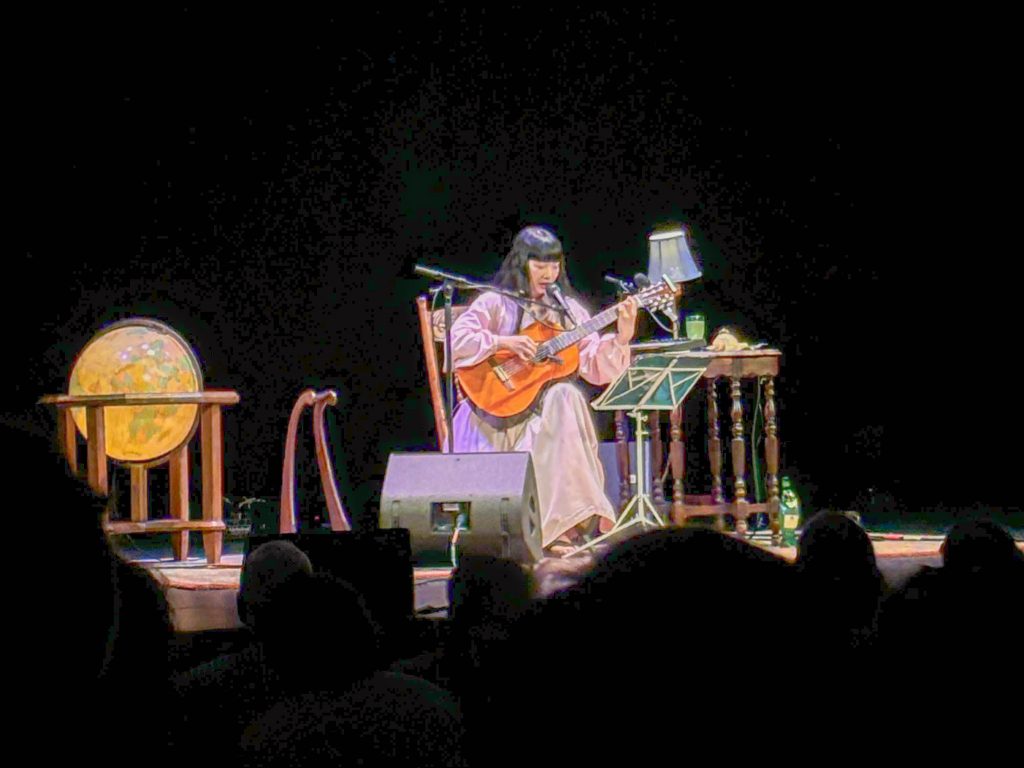
Ichiko Aoba performed the Philadelphia stop of her “Luminescent Creatures” world tour at the Miller Theatre on May 17. Although she began releasing music in 2010, the Japanese musician was relatively unknown until around 2021, when her music finally broke through to a wider audience here in the West.
The theatre was quite packed; since gaining traction, Ichiko Aoba has been steadily accumulating a following of listeners entranced by her songwriting. Aoba is famous for her ambient blend of classical and Japanese folk music. The acoustic guitar is her signature instrument, but she also plays other instruments, including piano. The merch stand offered unique items, including clothing and accessories with her own designs, as well as two books: a lyric book and a companion book. The lyric book contains a complete collection of her albums and singles released between 2010’s “Kamisori Otome” and 2022’s “Moshi Moshi,” with the original Japanese lyrics as well as their corresponding English translations. The companion book, “Dreams and Visions,” exists to bring to light Aoba’s creative vision for her 2020 album, “Windswept Adan.” Within it are intricate sketches, detailed notes, photographs and mood boards used for inspiration during the creation of the album.
Opening for her was Hayden Pedigo, a guitarist from the Texas Panhandle. He played three songs from his upcoming album, “I’ll Be Waving As You Drive Away,” before closing with “The Happiest Times I Ever Ignored” off his 2023 album of the same name. In between pieces, he engaged with the audience, sharing charmingly relatable anecdotes and a surprising amount of laughs. His down-to-earth personality and soothing performance set the mood perfectly.
Soon after Pedigo had finished his set, the stage began to transform into the cozy living room of a cottage as venue staff set up a muted red-patterned rug, a luminescent globe and a small music stand, as well as a wooden chair and desk, which was scattered with trinkets, a lamp and a small keyboard. The set dressing was far from elaborate, but the simple and homely atmosphere paired with Ichiko Aoba’s otherworldly soundscapes. Another key visual aspect of the concert was the phenomenal lighting work. Consisting mostly of cool tones with the occasional gentle warm white for good measure, the blues and greens cast upwards onto the black curtains behind Ichiko herself matched not only the cover artwork of “Luminescent Creatures,” but also the general tone and style of her music. The hues shifted slowly, almost imperceptibly, between songs, making each piece feel distinct while keeping changes subtle to pair with the ambient environment.
In describing Ichiko Aoba’s music, there seems to be only one word to define it: ethereal. Her compositions weave classical guitar, folk storytelling and hints of lush jazz harmony — characteristic of Japan’s modern musical landscape — into captivating, fantastical scenes. Aoba’s voice floats over these backdrops, sounding delicate and airy. Her timbre is gentle and almost whisper-like at times, but never feeble. Her song “Terifuri Ame” is an exceptional showcase of her singing; the gentle sweetness of the soft wails in her upper register especially bring to mind the enchanting effect of a siren’s call. The artist’s distinct vocal style lends itself well to soothing, lullaby-like tracks like “Asleep Among Endives” — her most popular song and a truly surreal experience to listen to live — and “Mazamun,” for which she set her guitar aside to coax undulating celesta arpeggios from her keyboard. Serene, lulling music is not the only style Ichiko’s voice is suited to, though. Songs like “IMPERIAL SMOKE TOWN” and “Kikaijikake no Uchuu” are more akin to folk stories told through song, and as she takes on the role of storyteller, her impossibly fragile vocals take on a more otherworldly, or even haunting, quality. Her heavenly melodies imbue these tales with a mysterious tone, somewhere between spirituality and fantasy á la the worlds of Studio Ghibli—works that Aoba often cites as major inspirations.
An aspect of Ichiko Aoba’s artistry that is best experienced live is her sheer mastery of her music, especially her guitar prowess. By only listening to the studio recordings of her songs, it can be easy to hear the instrument accompanying her as just that — a mere accompaniment. However, watching Aoba perform these arrangements live makes apparent the intricacies that are so easily obscured, the technical ability that gives her the framework for the body of the composition and the expertise that lets her make it look utterly effortless.
Live performances create a certain degree of connection with the potential to truly enhance an artist’s work, and Ichiko Aoba’s concerts are no exception. In spite of the language barrier, Aoba spoke to the audience between pieces, sharing her thoughts in both English and Japanese. When she struggled to express her thoughts in English, she, quite charmingly, communicated them by miming them. When miming failed her, she let the music communicate for her. It is this kind of connection that makes Ichiko Aoba well worth seeing perform in person.


